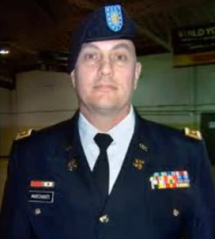
Army
Army National Guard Major Robert J. Marchanti II, 48, was a former elementary-school gym teacher just outside Baltimore. He and Air Force Lt. Col. John Darin Loftis were working inside a small room at the National Police Coordination Center in the Afghan interior ministry Saturday afternoon when a ministry driver entered and killed them both. The shooter fled and remains at large; the Taliban said the burning of Korans at Bagram air base a week earlier, which U.S. officials insist was accidental, drove him to act.
“This just does not feel real,” Ian Marchanti, his 18-year-old son said, told the Baltimore Sun in Tuesday’s edition. The family was looking forward to celebrating his father’s year-long deployment to Afghanistan, perhaps with a trip to Puerto Rico, when he came home in September. “One day we are planning a vacation, and then my mother is traveling to Dover,” the Delaware air base where his father’s body arrived late Monday.
The two deaths could serve as a turning point for the U.S. mission in Afghanistan.
While both the White House and the Pentagon insist nothing has changed, and U.S. troops will be in Afghanistan for nearly two more years, there’s a sense that the U.S. public is increasingly turning against the war. That’s going to make it tough for the bill proposed by Rep. Howard McKeon, the Republican California congressman who chairs the armed services committee, top get much traction. McKeon, as early as Tuesday, is expected to introduce legislation that would bar private contractors or members of Afghan security forces fro guarding U.S. bases in Afghanistan.
He has complained that President Obama’s troop-withdrawal plan is driven by the calendar, and not conditions on the ground. “When the president gives timelines not based on conditions on the ground, that’s the thing that puts us in jeopardy,” McKeon told CNN on Monday. “Instead of following timelines, we ought to make these changes based on conditions on the ground recommended by our leaders, General [John] Allen and those who are in charge over there.” (Yochi J. Dreazen has a good look at the GOP’s shifting alliances with U.S. generals at National Journal).
Pentagon officials have said securing U.S. bases with U.S. troops instead of contractors or Afghans would require 20,000 troops pulling guard duty instead of training Afghan forces or hunting down insurgents. It’s additional evidence that the U.S. has kept troop levels artificially low by hiring contractors to do what troops used to do. A 2011 Congressional Research Service report said there were 87.483 contractors supporting 96,900 troops in Afghanistan; the troop total has come down to 90,000 and is slated to shrink to 68,000 by this fall.
Meanwhile, back in Baltimore, Marchanti’s children recalled how their parents met at a Friendly’s restaurant, where he was a cook and Peggy scooped ice cream. He took her to his senior prom, and they had been together ever since. When he came home, he’d greet his wife with “a huge disgusting kiss, putting his arms all over her,” daughter Leah told the Washington Post. “She acted like it was too much, but she loved it.” So did his daughter. “He loved sentimental things…like dancing with me. We always talked about the song we would choose when I walked down the wedding aisle.”
Marchanti is survived by his wife, four children, and a three-month old grandson, born while Major Marchanti was on his first deployment to Afghanistan.


